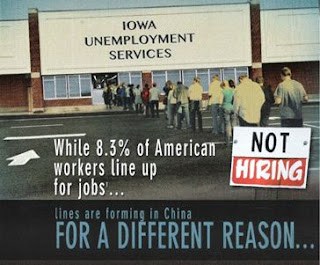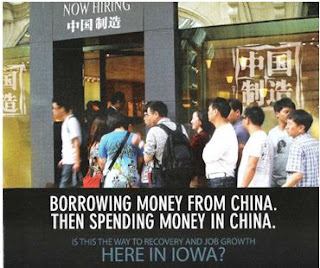The effort to demonize China:
There is a lot of talk about the polarization of political
parties in the U.S. these days. But party candidates from the left or the right,
liberal or conservative, seem to unite on one issue – bashing China.
In this game, party candidates compete to paint the darker
picture of China in order to get more votes.
For their part, voters are disillusioned by major shocks such
as losing their jobs or their homes, or by the simple fact that they can no
longer spend money they don’t have by borrowing.
More importantly, voters need to find someone, a target,
against whom to vent. No candidate wants to tell them that we as a country need
to cut costs. Neither do they want to tell voters that they should pay more
taxes.
So let’s blame all
the problems on China. After all, China steals our jobs by producing cheaper
products with unfair government subsidies. It pirates our technology so that our
companies lose billions. It manipulates the value of its currency so that they
can sell us more than they buy from us. It violates human rights by putting
dissidents in jail.
The presidential candidates from both parties are calling
China cheaters and liars. The Obama Administration has filed several trade
complaints against China, just in time for the end run toward re-election. For
his part, Mitt Romney has promised that if he is elected, the first thing he
will do is to declare China a “currency manipulator”, whatever that means.
I called a friend in China and told her about the Romney
flier.
I received a Romney flier in the mail which claims that the
8.3 percent of jobs that were lost in America went to China.
I called a friend in China and told her about the Romney
flier. She laughed sarcastically and told me that she was just forced to retire
at 55 so that she can vacate her position for young people waiting in line, and
that her son has been looking for a job for the past year since he graduated from
college.
I am not an expert on currency manipulation. As a consumer, I
certainly enjoy the low prices of Chinese goods in American stores, which are
sometimes even cheaper here than in China. That’s despite the fact that the average
American income is many times higher than in China.
The China bashers say that we borrow money from China and
then spend it there. When I look at the some 1,800 Chinese students on campus
and the several hundred million dollars they bring from home each year, I
cannot help but think that China is subsidizing the U.S. government and
boosting local American economies, at least in the college towns that
increasingly attract them.
I want to vote for someone who can figure out how to get
along with China.
Bashing China can only postpone solving the problems in the
U.S., such as overspending, special interest domination, and the disproportionate
privileges that the rich enjoy.
The Chinese share the same need for dignity and pride as do Americans,
and in fact, as any human beings. Calling the Chinese cheaters and liars only
creates more anti-U.S. sentiment, of which we already have plenty to deal with
in the world.
The UCLA political scientist John Zaller, during his recent
visit to the University of Iowa, said that political scientists should try to
figure out how people can get along, not how to compete with each other.
China is the second largest economy in the world and will
probably surpass the U.S. and become the largest economy in the next decade.
I want to vote for someone who wants to get along with
China, and who can focus on solving the domestic problems here at home.
More importantly, I want to vote for someone who can look
beyond the short-term electoral game and work on America’s long-term national
and international interests, which are significantly entwined with China and
depend to a large extent on how our two countries will get along.

